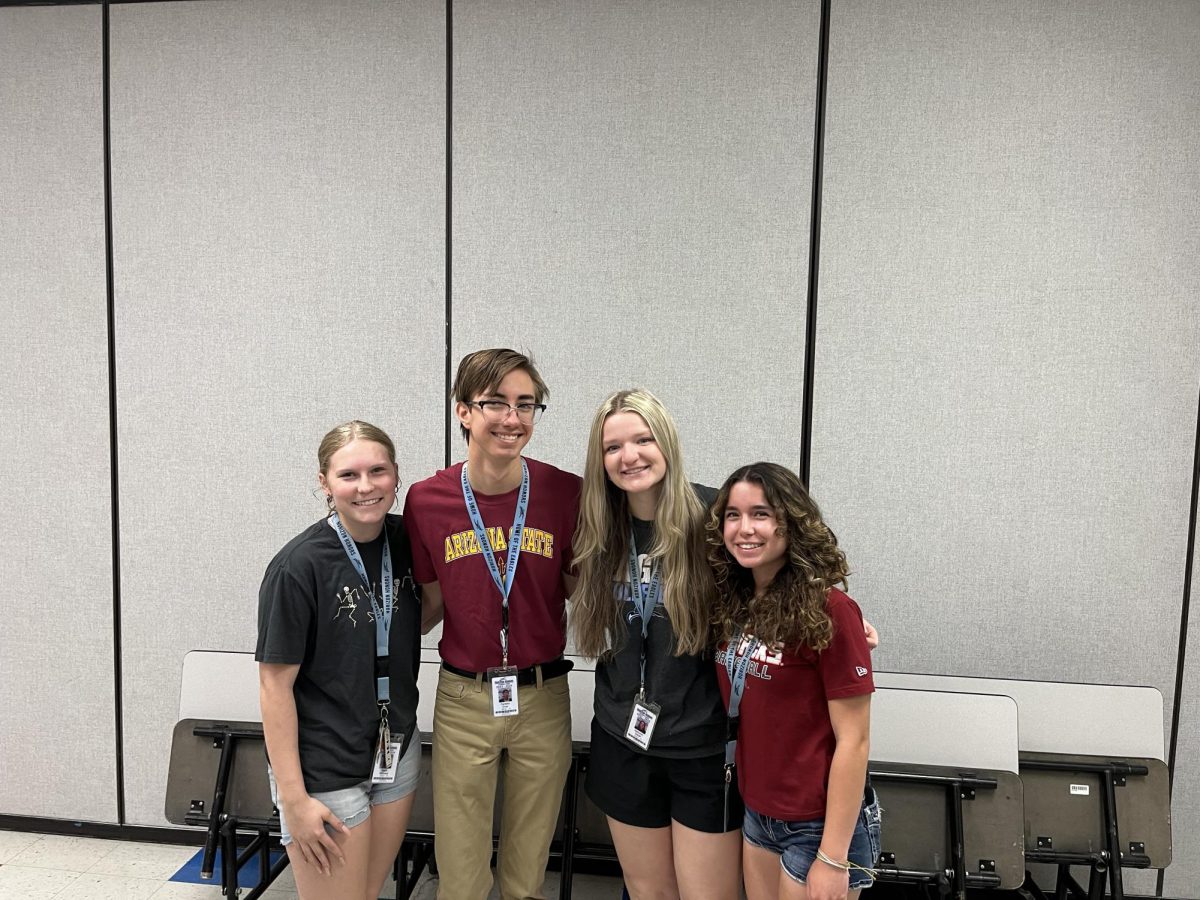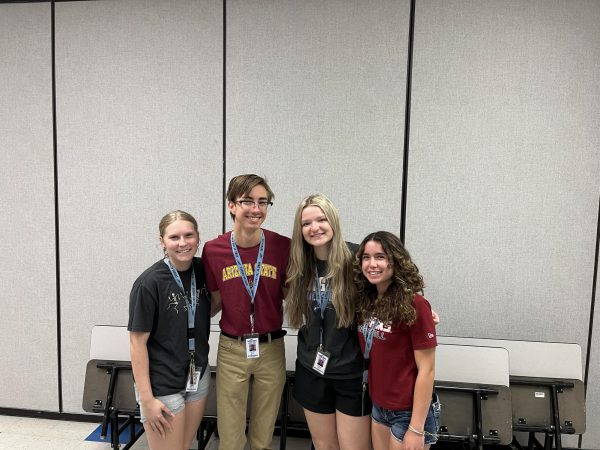Me vs. OCD: Fighting Anxiety Disorders
A long-winded tale of my experience with OCD and how one goes about living with it. Trigger warnings for mentions of graphic imagery and heavy topics.
February 16, 2018
One of my earliest memories is lining up my toys in a row. I got my little sister in on the deal, and I made my collection of stuffed animals, plastic horses, Webkinz dogs, and anything else I labeled “toy” in my head stand one after the other throughout the house, winding and twisting and double-crossing. As chaotic as the line of toys may have seemed, each toy was placed a precise distance behind the next toy, in a precise position. When I think back to that day, I wonder why nobody considered that I had Obsessive-Compulsive Disorder (OCD) until late last year, as a sophomore in high school.
Another early memory of mine is when I scraped my knee on the concrete sidewalk. There was blood. I cried, even though it didn’t really hurt. I didn’t just cry because I was a scared child, but because I felt uneven. One “hemisphere” of my body was bloody and wounded, while the other was fine. I wanted to even it out. I didn’t.
I learned to live my life based on patterns and symmetry. Each hemisphere of my body must match the other side. I had a brilliant knack for typing using the home row keys because I could move my fingers so fast that I couldn’t keep track of which finger did what, when, and how I could repeat it on the other side. When one knee got scraped, I had to scrape the other. One arm got bruised, bruise the other. If you hurt the other arm too much, do it to the original bruised hemisphere until each side had an even amount of pain. I couldn’t walk on the cracks in the tile and needed to alternate which foot hit the next square of concrete. I followed rules that made sense to no one but me. “Interlude 1” by alt-j describes this feeling perfectly, at least to me. If any of these rules were broken, the opposite hemisphere must go back and do it the same way.
If you were to ask me why, I wouldn’t have been able to give you an answer. It just was. I must be even, or I felt sick to my stomach. Some drowning feeling would overtake my conscious until I corrected the imbalance. I could focus on nothing but the imperfection, the blemish, the unevenness that life is made up of. I liked to keep my room relatively clean because I thought if I didn’t, my mom would be mad at me, then she wouldn’t talk to me, then I would feel bad, then I wouldn’t really want to talk to her, which would make her not want to talk to me, and it would keep getting worse and worse and worse until we didn’t love each other anymore. To me, if I kept my room clean, I could control my mother’s love. If one leg was hurt and not the other, then that leg wouldn’t be used as much, making it weaker, which means I wouldn’t be able to do the same things as other people, so kids would make fun of me, and then they would hate me, and now I was believing that only hurting one half of my body would lead to severe bullying.
However, this is only one aspect of OCD. It’s the aspect familiar to people, the one that isn’t so scary. It’s odd, yes, but the compulsive hand washing, the evenness, the refolding of clothes if they weren’t “done right” the first time? Those things are known by society. What isn’t so obvious are the intrusive thoughts. The unwilling obsessions.
These intrusive thoughts range in severity. I used to eat paper because I liked the texture of it, but I only first started eating it because my mind told me to. I would break the tips off pencils and chew on things I knew weren’t edible because some part of me wanted to feel the texture. But this is the light end.
Sandpaper used to hold a terrifying place in my heart. I used to be rendered bedridden due to the fear of finding sandpaper and not being able to stop myself from scraping at my skin until it bled. I would play music, watch Netflix, sometimes even just cry; I would do anything to relieve myself from the graphic imagery of this intrusive thought, but nothing would work until my head decided to leave it be. At times, I would want to chew on broken glass to feel the crack-crunch underneath my teeth and cutting into my tongue. I have a horrible habit of picking at my acne until it bleeds, and then until it scars and can’t bleed anymore. I still render my fingers useless from time to time, due to hangnails that I can’t help but yank out of my skin.
It sucked. It still sucks.
The question back then, and the question still now, is how to survive the fear. The needless anxiety. The urges. The pain. The hacksaw shambles of a brain destroyed by its own chemical imbalances and malfunctionings. How do I, a child, piece together a life where OCD doesn’t encompass every move I make, every thought I have, every emotion I feel? I didn’t know how to do that, because I didn’t know a life outside of myself. I only knew how to be me with OCD and all the other risks that come with it.
Prozac (Fluoxetine) was a gift from the gods. Although Lexapro had considerable influence over my “ticks” (the cleaning, the patterns, the hemispheres), it didn’t kill the intrusive thoughts. Prozac did.
I’ve learned that I am probably always going to have to accept having one aspect of OCD or the other – violent thoughts, or matching up my hemispheres and patterns. At this point, these hemispheres aren’t so dangerous to have uneven. I don’t need to hurt the other side of my body anymore, but I can’t help but feel a bit of satisfaction if both my knees get hurt, just so that it doesn’t bother me. I still pick at my nails and skin, but I have jewelry and stim toys to help me keep my hands off my skin and keep me from bleeding and scarring. My friends learned (of their own volition) to watch me and stop me from hurting myself, be it grabbing my hands or letting me sit quietly and untouched. I can deal with stranger sensations and uneven textures. Sandpaper doesn’t scare me so much.
I don’t know what life is like without OCD. What I do know is that I can fight a war against a dysfunctional brain and win. I survived impulses, doubts, irrational fears, irrational urges, irrational thoughts, irrationality at its most primal. There are days where I lose the battle, but the war will never be over. I win more days than I lose.
I’ve learned how to do more than survive with OCD.
I know how to thrive with OCD. In spite of it. Because of it. With it.













